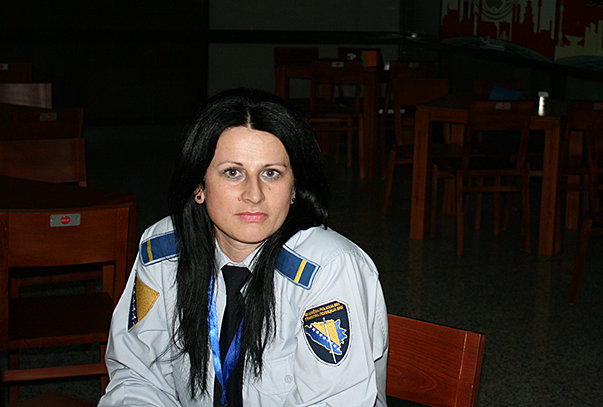By Aleksandra Tolj, Mladen Lakić
Davorka Vrgoc, a 50-year old single mother of six, spends her days scouring the Bosnian countryside for landmines left over from the war.

Mine clearance is not something Vrgoc could ever have imagined herself doing. But as she puts it, “Life has forced me to look for any kind of job.”
This unusual work would at one time been deemed totally unsuitable for a woman.
Although the socialist Yugoslav state proclaimed sexual equality, it was common for fathers and husbands to forbid their wives and daughters to do certain types of work
These days, feminist activists in Bosnia and Herzegovina, BiH, say gender roles are evolving.
“With the disappearance of an ideology that imposed an official view of the world, new opportunities have appeared for various forms of female activism which didn’t exist under socialism,” explained Zlatiborka Popov-Momcinovic, a feminist activist and sociologist.
Some women have found their role in society utterly transformed.
Alma Kadric was 21 and studying to become an engineer when the Bosnian war broke out in 1992. She gave up her career plans and joined the Bosnian government army instead. The decision shocked many people, but Kadric says they changed their minds after seeing her treat the wounded and serving as an army welfare officer.
“A woman among men in the war had an incredibly positive effect. You could see men shaking with fear at the bullets and shells, and then there was a woman who was stable and calm, who believed all this would pass…. It had an effect on people,” Kadric said.
When the war ended, Kadric decided her future lay in the military. Now living in the Sarajevo neighbourhood of Bistrik, her current job involves updating the armed forces’ database on stock of arms and equipment, new procurements, and weapons decommissioned and destroyed.
Kadric says she never experienced discrimination in the army, and has managed to pursue a military career at the same times as raising a family. Her husband is a former Yugoslav army officer, now a civilian.
Although some women have carved out successful careers in such traditionally male-dominated fields, Popov-Momcinovic notes another trend of the post-socialist era, going in precisely the opposite direction. Describing this as a process of “re-traditionalisation”, she says women are being directed back to the “private sphere” of home and family, where those of conservative mindset feel they properly belong.
Women are notably absent from Bosnia’s political leadership. Although Republika Srpska, recently gained a female prime minister, Zeljka Cvijanovic, there are no other women at ministerial level across BiH, none has ever served in the country’s tripartite presidency, and only 17 per cent of women overall are counted as active in political life.
Republika Srpska’s Assembly has 19 women among its 83 members, while the House of Representatives, the parliament of the Bosniak-Croat entity, the Federation, has 22 female members out of a total of 98.
In the world of business, female entrepreneurs say they have to be exceptionally persistent to succeed in what is still a patriarchal social environment.
When the war began in 1992, Mirsada Venturini Mehmedinovic, then 23, moved to Italy, where she initially worked in a kitchen while learning the language. Once she mastered Italian, she started working as an interpreter and eventually found a job in a textile factory. With that experience behind her, she decided to return to BiH and start a shirt factory in her home town of Lukavac.
“I thought it would be easier to work in an environment where people knew you. I later found out this wasn’t the case”, said Mehmedinovic, now director of the factory she owns.
In Italy, she said, people “first see you as a person and only then as a woman”, adding that in BiH, it was the other way round.
“Discriminatory attitude can be felt from doormen up to ministries,” Mehmedinovic said. “An able woman who’s opinionated and willing to speak her mind is not going to get the level of acceptance and acknowledgement she deserves.”
While old prejudices remain, observers say significant progress has been made on tackling gender issues. Violence against women, for example, is no longer seen as a private, personal matter, and the state is obliged to take legal action.
“The socialist state, unfortunately, used to avert its eyes from this. It was regarded as something that was almost natural, even though socialism had promised radical emancipation of women,” Popov-Momcinovic said.
Women are now part of the police force and interior ministry, which was very rare before the war.
Amela Zukovic is part of a new, post-conflict generation of female police officers.
She was expecting to start working in a textile plant before the outbreak of war derailed her plans, but as she says, “There are things in life that we don’t choose and can’t plan.”
Zukovic arrived in Sarajevo after the conflict ended in 1996 with no skills or experience, but took the opportunity to enroll in Bosnia’s police academy. Although this was not her ideal job at the time, she has no regrets.
She now works for the border police at passport control. When it comes to balancing home and work commitments, Zukovic says her husband – also a police officer – and two children have been supportive.
“My older son is used to seeing his mother in uniform, although most of his peers’ mothers are unlike me,” she said. “I’ve never had any problems from the fact that I’m a woman. I love what I do and I don’t find my assignments hard. The only difference is that there’s an informal system where it’s the men who do the night shifts in the border police.”
At the same time, Zukovic noted that her unit does not have a single female commander.
This article was produced as part of Tales of Transition project funded by the Norwegian Embassy in Sarajevo. SCCA/pro.ba is carrying out this project in co-operation with the IWPR and EFM Student Radio.